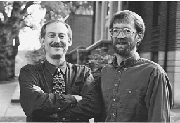The following are among many faculty volumes available in the Seattle
Pacific University Bookstore. To order a book, or to request a full listing
of SPU faculty books, call 206/281-2136.
Community of the Wise:
The Letter of James
Trinity Press International, 1997
Robert W. Wall
The Book of James and its emphasis on holy living was crucial in the
theological formation of John Wesley. It has been similarly influential
in the life of Wesleyan scholar Rob Wall, Seattle Pacific University professor
of biblical studies. When he was invited to contribute a commentary on James
to "The New Testament in Context" series for Trinity Press International,
he was ably prepared.
Wall does not conduct his scholarly investigations in a vacuum. Lively
discussions of James have been an integral part of his "Introduction
to the New Testament" class. Every question asked for which he did
not know the answer led him to further research. "I listen carefully
to my students. What they ask and what they write lead me onto all kinds
of profitable pathways to a richer understanding of the text."
One of those paths became the central theme of Wall's commentary: virtually
everything in James aims at forming a community of believers who are competent
at living for God in the world, and wise enough to make the life choices
that nurture a faithful relationship with God.
"With a resurgent interest in James, biblical scholars are following
the lead of rank and file believers," Wall says. "It's as practical
as the Book of Proverbs; we readily recognize ourselves in it and can respond
to its teaching."
The Book of James, in Wall's view, has sometimes been read as a kind
of foil to Paul and his theological beliefs. Wall thinks that the theological
differences between Paul and James point out different ways to understand
the core convictions of the Christian gospel. "Both are parts of an
inspired whole," he notes. "We should read them as partners that
complement each other."
Hardship and Hope:
Missouri Women Writing About Their Lives, 1820-1920
University
of Missouri Press, 1997
Edited by Carla Waal and
Barbara Oliver Korner
Pioneer women of America's past had little voice in an era when only
men were thought to have anything important to say. Thankfully, many journals,
letters, diaries and memoirs of these courageous, opinionated and often
deeply religious women have survived the years. A significant number of
these documents have been preserved in Hardship and Hope: Missouri Women
Writing About Their Lives, 1820-1920.
Edited by Seattle Pacific University Associate Professor of Theatre Barbara
Korner and her colleague Carla Waal of the University of Missouri Columbia,
the spirited anthology represents a broad range of experience including
those of African-Americans and Jewish, Irish and German immigrants.
From Phoebe Wilson Couzins, the first woman law graduate in Missouri,
to Emma J. Ray, a Free Methodist prison missionary born a slave, Hardship
and Hope rings with strength of cause and emotion.
Korner and Waal have done performances from the book and signings at
libraries, colleges, bookstores and historic archives where they hear repeatedly
that people today feel a valuable connection to the women of the past. "How
pioneer women coped with problems in society and in their personal lives,
what they thought about major events in the world, and how they expressed
their faith is still relevant," says Korner. "We empathize with
them and rediscover that there really is nothing new under the sun."
|


